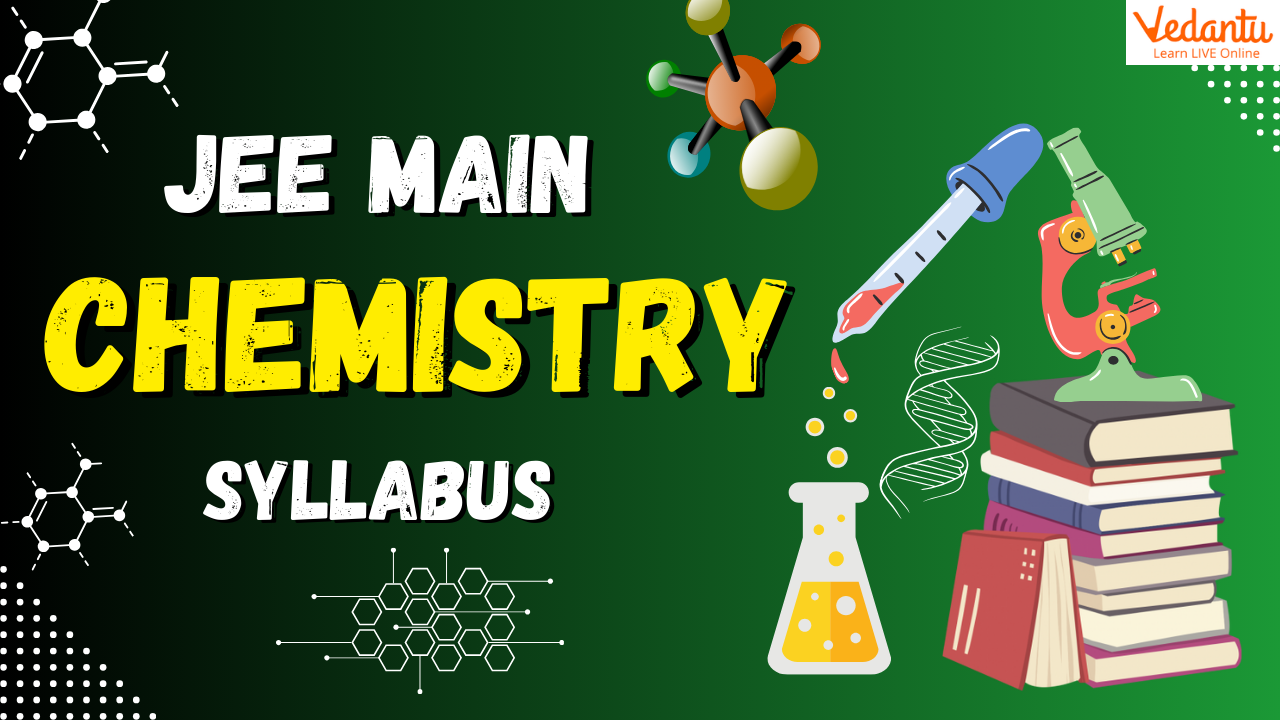Chemistry JEE Main Syllabus 2026 PDF - FREE Download
FAQs on JEE Main Chemistry Syllabus 2026 : Weightage & Deleted Topics
1. What is the JEE Main Chemistry Syllabus for 2026?
The JEE Main Chemistry Syllabus for 2026 covers a broad range of topics in physical, inorganic, and organic chemistry. The syllabus is designed to assess the candidate's understanding of fundamental concepts and their ability to apply them to solve problems.
2. Where can I download the JEE Main 2026 Chemistry Syllabus PDF?
You can download the JEE Main 2026 Chemistry Syllabus PDF from the official website of the conducting authority. We provide a direct link to the PDF on Vedantu’s page for your convenience.
3. Why is it important to know the weightage of topics in the JEE Main Chemistry syllabus?
Knowing the weightage of topics in the JEE Main Chemistry syllabus helps you prioritise your study time and focus on the most important areas. This can significantly improve your chances of scoring wrong in the exam.
4. How do I prepare effectively using the JEE Main Chemistry Syllabus?
Here are some tips for preparing effectively using the JEE Main Chemistry Syllabus:
Create a study plan: Break down the syllabus into manageable chunks and create a study plan that you can follow consistently.
Focus on Understanding the Concepts: Don't just memorise facts and formulas. Try to understand the underlying concepts so that you can apply them to solve problems.
Practice Solving Problems: Regular practice is essential for improving your problem-solving skills. There are many practice problems available online and in textbooks.
Take Mock Tests: Mock tests help you assess your preparation and identify areas where you need to focus more.
5. Is there any specific exam strategy based on the syllabus for JEE Main Chemistry?
Here are some tips for developing a specific exam strategy based on the syllabus for JEE Main Chemistry:
Manage your time effectively: The JEE Main exam is time-constrained, so it is important to manage your time effectively. Practice solving problems under timed conditions to improve your time management skills.
Answer easy questions first: Don't get bogged down on difficult questions. Answer the easy questions first to maximise your score.
Mark difficult questions: If you find a question too difficult, mark it and move on. You can come back to it later if you have time.
Use diagrams and graphs: Diagrams and graphs can help you visualise concepts and solve problems more easily.
Check your work: Before you submit your answer sheet, take a few minutes to check your work for careless mistakes.
6. Has there been any reduction in the JEE Mains Chemistry syllabus 2026?
Yes, certain topics have been removed from the chemistry deleted syllabus JEE mains 2026. The updated chemistry reduced syllabus JEE mains 2026 is designed to align with current academic standards, focusing on core concepts. Checking the chemistry JEE mains syllabus 2026 will help ensure you study only the relevant topics.
7. Where can I download the JEE Mains Chemistry syllabus PDF for 2026?
The JEE mains chemistry syllabus pdf for 2026 can be downloaded from the official NTA website or Vedantu’s resource page. Having the JEE mains 2026 chemistry syllabus in PDF format is beneficial for quick access and efficient planning of study schedules.
8. What is the JEE Mains 2026 Chemistry syllabus with weightage?
The JEE mains 2026 chemistry syllabus with weightage highlights the importance of specific topics, helping students prioritise their preparation. Key areas in the JEE mains chemistry syllabus with weightage include topics like Thermodynamics, Chemical Bonding, and Organic Reactions, which tend to carry more questions in the exam.
9. How can I know which topics were removed from the JEE Mains 2026 Chemistry syllabus?
The topics removed are listed in the chemistry deleted syllabus JEE mains 2026. Reviewing this chemistry-reduced syllabus JEE mains 2026 ensures you focus on the updated curriculum. Refer to the JEE mains 2026 chemistry syllabus on Vedantu’s page or official NTA resources for the precise details of excluded topics.



























